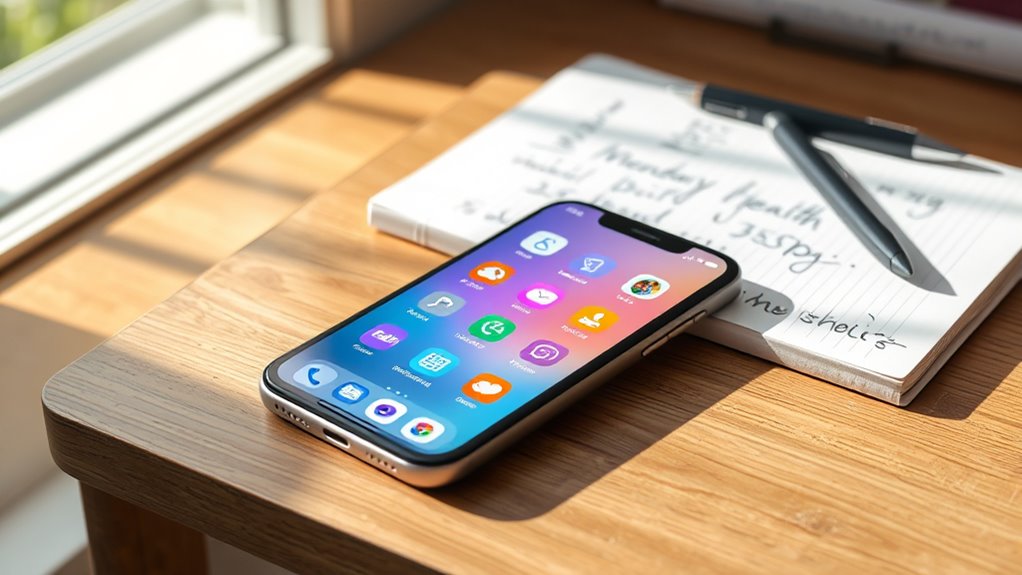To evaluate mental health apps, focus on ones that promote user engagement through features like daily check-ins, activity tracking, and interactive exercises. Guarantee they prioritize your data security by using strong encryption and transparent privacy policies. Reputable apps adhering to standards like GDPR or HIPAA best protect your personal information. Balancing engaging features and privacy is key to effectively supporting your mental health—continue exploring to find the best options for you.
Key Takeaways
- Assess app features like personalized reminders, progress tracking, and interactive exercises to determine effectiveness in supporting mental health.
- Verify data security measures such as encryption and privacy policies to ensure user information is protected.
- Choose apps that comply with privacy standards like GDPR or HIPAA for stronger data protection.
- Look for transparent information on data collection, storage, and sharing practices to evaluate trustworthiness.
- Prioritize apps that balance engaging features with robust privacy safeguards to support sustainable mental health management.

Mental health apps have become a popular tool for managing stress, anxiety, and depression, offering convenient support right at your fingertips. As you explore these apps, you’ll notice that their success hinges on user engagement. If you don’t actively use the app, it won’t provide the benefits it promises. Developers understand this, so many prioritize features that keep you involved—like personalized reminders, interactive exercises, and progress tracking. These elements help you stay motivated and committed to your mental health journey. However, maintaining high user engagement isn’t just about keeping you hooked; it also relates to data security. When apps collect personal information—ranging from mood logs to sensitive mental health details—they must implement robust security measures. Strong encryption, regular security audits, and transparent privacy policies ensure that your data stays protected against breaches or misuse. You should always be aware of how your data is handled and feel confident that your privacy is safeguarded.
As you use these apps, it’s essential to evaluate how they foster user engagement without compromising your data security. Many effective apps incorporate features like daily check-ins and customizable settings, making it easier for you to integrate mental health practices into your routine. These tools can boost your motivation by providing immediate feedback and celebrating small wins, which keeps you coming back. At the same time, reputable apps clearly communicate their data security protocols, so you understand what information is collected, how it’s stored, and who has access. This transparency helps you make informed decisions about whether to trust the app with your personal data. Additionally, understanding the importance of user engagement in app success can help you choose options that balance support with privacy.
You also want to be cautious about apps that might prioritize user engagement at the expense of your privacy. Some free apps may gather extensive data to sell to third parties or display targeted advertising, risking your confidentiality. That’s why choosing apps with strong privacy policies and clear data management practices is essential. Look for those that adhere to privacy standards like GDPR or HIPAA, which set strict rules for data security and user rights. Ultimately, the most effective mental health app strikes a balance: it actively engages you with meaningful features while ensuring your sensitive information remains secure. Being mindful of these factors helps you get the support you need without unnecessary risks, making your mental health journey both effective and safe.
Frequently Asked Questions
How Do Mental Health Apps Ensure User Anonymity?
Mental health apps guarantee your anonymity by using data encryption to protect your information and implementing strict anonymity protocols. These apps often remove or anonymize personal identifiers, making it difficult for anyone to link data back to you. You’re encouraged to avoid sharing sensitive details, and many apps also offer options to log in anonymously or via secure third-party services, ensuring your privacy stays intact while you access mental health support.
Are Mental Health Apps Suitable for Severe Mental Health Conditions?
Mental health apps often have clinical limitations, making them less suitable for severe conditions. They generally can’t replace in-person therapy or emergency protocols needed in crises. If you’re dealing with severe mental health issues, it’s best to seek immediate professional help rather than rely solely on these apps. They can complement treatment but shouldn’t be your primary resource during emergencies or for complex conditions.
What Are the Costs Associated With Premium App Features?
You might be surprised by the costs of premium mental health app features. Subscription costs vary widely, often ranging from $5 to $20 per month, giving you access to advanced tools and personalized support. Be aware of in-app purchases, which can add up quickly if you opt for extra sessions or exclusive content. These expenses can markedly impact your budget, so always review the pricing details before committing to any premium plan.
How Often Should I Update or Change Mental Health Apps?
You should update your mental health app regularly, ideally once a month or whenever updates are released. Frequent app updates improve stability and fix bugs, guaranteeing a smoother experience. Additionally, updating helps protect your privacy by incorporating the latest security features. If you notice the app becoming unstable or outdated, consider switching or reinstalling. Staying current with updates ensures you get the best, safest experience for your mental health needs.
Can Mental Health Apps Replace Traditional Therapy Sessions?
Mental health apps can’t fully replace traditional therapy sessions, but they can supplement your mental health journey through digital therapy and app customization. These apps offer convenience and tailored support, helping you manage stress or anxiety between sessions. However, for deeper issues or personalized treatment, in-person therapy remains essential. Use apps as a helpful tool alongside professional help, not a complete substitute for the personalized care you get from a therapist.
Conclusion
As you navigate the world of mental health apps, remember they’re like a double-edged sword—offering support but also posing risks. Stay vigilant about their effectiveness and privacy policies, because trusting the wrong tool can be like planting seeds in barren soil. By staying informed and cautious, you can turn these apps into stepping stones rather than stumbling blocks on your journey to wellness. Your mental health deserves tools that nurture, not harm.








